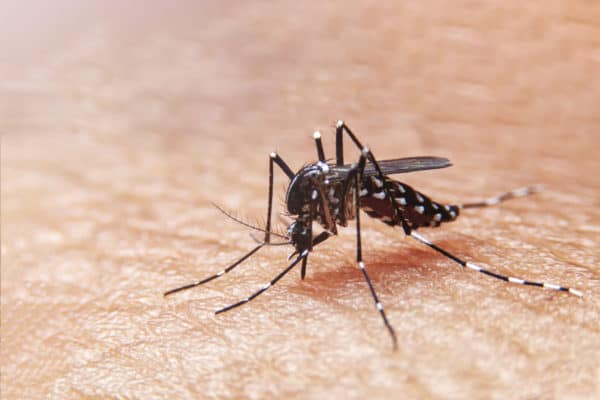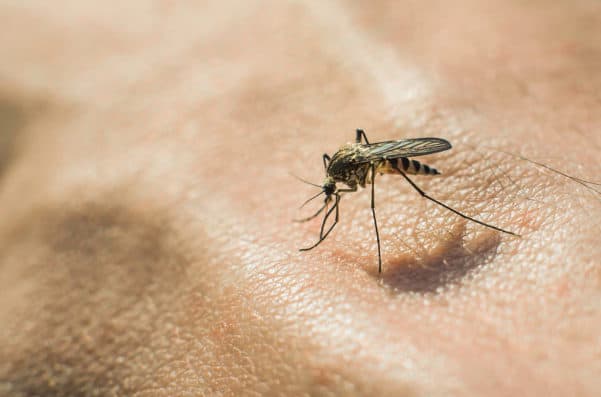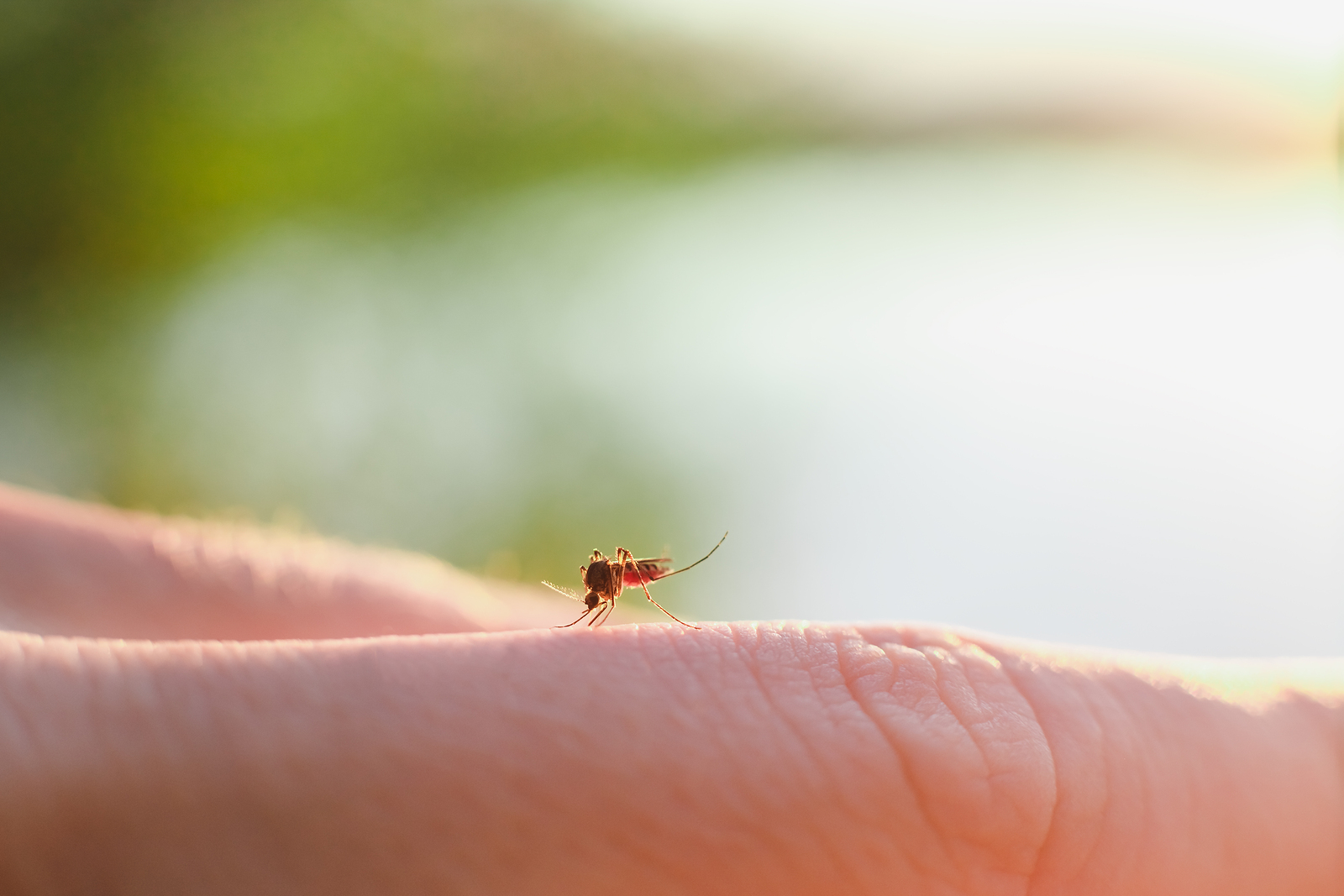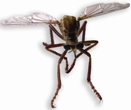READY TO GET STARTED?
REQUEST A FREE ESTIMATE
Fill out the form below or call (888) 466-7849 for a free, no-obligation estimate.

The peak of mosquito season is from April to October. During this time, mosquitoes invade, leaving behind itchy bites and aggravation. They are also capable of spreading serious diseases such as Zika and West Nile virus. While many of us take precautions by using mosquito repellent and wearing long sleeved clothing, sometimes these prevention techniques just aren’t enough. A mosquito treatment is often needed to help control mosquito populations.
There are two options to mosquito treatments – green and traditional. Green mosquito treatments utilize products derived from flowers and bacteria that are only applied to the areas where they are needed, minimizing their impact on surrounding areas. These treatments also work on adult and larvae.
A traditional mosquito treatment consists of 5 steps:
How much does a mosquito treatment cost? Treatments typically last between 21 and 30 days and should be applied as often. Most treatments are billed per 1/4 acre or per 1/2 acre. Generally only the perimeter of the yard is treated, concentrating on areas of foliage and woods. The average cost of a mosquito treatment is between $350 and $500 per season for a 1/4 to 1/2 acre property. This cost can range anywhere from $325 up to $1900 depending on the size of the property and the frequency of treatments. Mosquito treatments are performed on a monthly basis with an average of $70 to $100 cost per visit. Some companies will offer a discount on this rate if you sign up for recurring treatments.
While there are DIY mosquito treatments available, a professional pest control company has the experience, training, and equipment to get rid of mosquitoes and keep them away. Most will utilize an Integrated Pest Management (IPM) program that combines a variety of treatment and control methods to eliminate mosquitoes with minimal impact to the surrounding environment.
Protecting Your Garden From Birds
The 411 on Granddaddy Long Legs
The Summer Big Three: Roaches, Mosquitoes, & Termites

In some places, especially the southern United States, mosquito season can seem like it lasts forever – or at least for the majority of the year; and in some cases it actually does. Mosquitoes are most often associated with the hot summer months but the season actually begins earlier than that and can run through fall. Besides being annoying, mosquitoes can also pose serious health hazards to both humans and animals. Mosquitoes are known to transmit serious diseases like West Nile virus, Zika virus, chikungunya, and eastern equine encephalitis.
Because mosquito activity is primarily driven by temperature, mosquito seasons vary from region to region. Some species of mosquitoes hibernate during the winter and emerge when the weather warms up. Other species die off when cold weather arrives and their offspring hatch from previously laid eggs in the spring. Regardless of the species, most mosquito activity begins when temperatures consistently reach above 50 degrees Fahrenheit. As temperatures increase, so does mosquito activity, making peak mosquito season in the hot summer months. As the weather begins to cool down, so does mosquito activity. Those mosquito species that hibernate over winter will begin looking for their winter dwellings in hollow logs, abandoned animal burrows, and other places. Those mosquito species that don’t hibernate will begin dying off as temperatures drop below 50 degrees. Because of this, those places with warmer climates will have mosquito season begin earlier and last longer than those with cooler climates.
There are some do-it-yourself pest control steps that you can take to help minimize mosquitoes on and around your property. Try to implement these before mosquito season starts when temperatures are still below the 50 degree mark. Waiting until mosquito season means the breeding population will already be established and will be much harder to control.
Even with these proactive steps, mosquitoes can still be difficult to control. Consider investing in a professional mosquito control program that can reduce mosquitoes, help prevent mosquito bites, and limit your risk of mosquito-borne disease. A mosquito control program from a licensed pest control company can provide you with treatments throughout mosquito season.
How to Help Your Lawn During Late Summer
Are Millipedes Helpful or Harmful?
Pest Control for Basements and Attics

The South is known for many things like warm weather, sweet tea, and southern hospitality. Unfortunately, the south is also known for another thing – mosquitoes! Mosquitoes thrive in warm, humid climates like we have here in the southern United States. As the weather warms, mosquito season begins and peaks in the mid-summer months. Mosquitoes can breed in less than 1 inch of water so the South offers them a multitude of habitats to expand their populations.
Mosquito bites cause irritation and itching of the skin. Besides this nuisance, mosquitoes can also transmit diseases that can threaten the health of both humans and animals. Here are some of the most common diseases that can be spread by mosquitoes:
Now that you know some of the diseases you can contract from mosquitoes what can you do to prevent them? Avoiding mosquito bites is the #1 way to prevent all of the diseases mentioned above. Check out these tips to avoid mosquito bites and help keep them away from yourself and your home.

Mosquitoes are known carriers of several viruses, transmitting disease and parasites to people and animals that come in contact with them via painful bites. While some of these diseases don’t pose serious health risks, others can be deadly (over one million people die each year from mosquito-borne diseases, according to the AMCA!). Here are 3 common mosquito diseases you should be cautious of this summer:
First discovered in 1947, Zika, a mosquito-borne virus, originated in Uganda, Africa. Shortly after, outbreaks of Zika were detected throughout tropical areas in Africa, Southeast Asia, and the Pacific Islands, according to the CDC. Now, mosquitoes carrying Zika have been identified in many countries, including the U.S.
Primarily transmitted by the Aedes species, infected mosquitoes can spread Zika to humans and animals through bites. These mosquitoes are active during daytime and evening hours. Zika can also be sexually transmitted from one infected partner to another, from pregnant women to unborn babies, and through blood transfusions.
Common symptom of Zika include rash, fever, joint and muscle pain, headache, and/or red eyes and can last for up to a week, but many infected won’t show any symptoms at all. Zika is dangerous specifically for pregnant women as it can cause birth defects, a condition called Microcephaly, in fetuses. This can cause brain and eye defects, hearing deficits, and impair growth.
Because there’s currently no vaccine to treat and/or cure Zika, the best way to protect yourself is by preventing mosquito bites. Keep arms and legs covered in loose, light-colored clothing when outdoors and use insect repellent. Repair or replace missing or damaged window and door screens at home and keep them closed as often as possible. Control mosquito populations around your home by getting rid of adult mosquitoes as well as reducing mosquito reproduction with home mosquito treatments from a licensed pest control company. Most companies offer eco-friendly mosquito treatment options that are family and pet-friendly, if having your yard treated with chemicals is a concern. If pregnant, the CDC advises to avoid traveling to countries with known Zika outbreaks – see the list here – and refrain from unprotected sex.
Check with your doctor to get tested. To minimize symptoms, drink lots of fluids, get plenty of rest, reduce fever or pain with over-the-counter pain medicines (avoid aspirin), and prevent additional mosquito bites. If you’re bitten by a mosquito once infected, you can pass Zika to other mosquitoes, who will then infect someone else – increasing the spread of Zika. If you’re pregnant and suspect you have Zika, contact your physician immediately.
The first occurrences of West Nile in the U.S emerged in New York in 1999 with 62 confirmed cases and 7 human deaths, according to the AMCA. West Nile virus is a mosquito-borne virus carried by many different mosquitoes, one of the most common being the Culex species.
West Nile is most often transferred from birds to mosquitoes, and then from mosquitoes to humans and animals through bites.
Symptoms may develop 3-14 days after bitten. Typically only 20% of people infected with West Nile virus will experience symptoms which include headache, body aches, and fever and usually last a week or less. Rarely, the virus develops into West Nile encephalitis which can cause high fever, neck stiffness, disorientation, coma, muscle weakness, convulsions, paralysis, and sometimes death. This is most common in people over the age of 50.
Like Zika, there is no vaccine for West Nile virus. Prevent the virus by preventing mosquito bites.
See your doctor. A blood test can determine if you’re infected with West Nile virus. If symptoms are severe, hospitalization may be necessary.
Dengue, a mosquito-borne virus, is the leading cause of illness and death in the tropics and subtropics according to the CDC (400 million people infected each year). While it rarely occurs in the U.S., it’s important to be aware of dengue while traveling to popular tourist destinations like Puerto Rico, parts of Central and South America, Southeast Asia, and the Pacific islands. Dengue is carried by the Aedes aegypti and Aedes albopictus mosquito species which are found throughout the world.
Mosquitoes carrying dengue infect humans through bites and infected humans can infect other mosquitoes, when bitten.
Most cases of dengue in the U.S. were acquired through travel abroad. Symptoms include severe headache, high fever, eye pain, joint pain, muscle pain, and rash. Severe cases can cause stomach pain, vomiting, difficulty breathing, and bleeding from gums and/or nose.
Mosquito bite prevention is key when traveling to areas with known dengue outbreaks as there is no vaccine for dengue or medications to treat it. It’s especially critical for people with dengue to avoid mosquito bites so the disease isn’t spread from person to another mosquito.
If symptoms are mild, lots of rest and fluids are recommended. For more severe symptoms, contact your health care provider immediately.
Northwest Exterminating cautions travelers about mosquito-borne diseases
Many people are looking forward to escaping the winter chill by jet setting to a warmer destination during Spring Break, but they may find themselves with a biting problem – mosquitoes. Northwest Exterminating encourages Spring Break travelers, especially those visiting a tropical location, to take precautions to protect themselves from these blood-sucking pests.
Unfortunately, mosquitoes can inflict more then just painful bites. Travelers are at an added risk of contracting mosquito-borne diseases like West Nile virus, Malaria and Dengue Fever.
 Anyone traveling to the Caribbean should also be aware of Chikungunya virus, an infection spread by Asian tiger mosquitoes that was recently reported in St. Martin. According to the Centers for Disease Control and Prevention (CDC), the virus is characterized by fever, rash, fatigue, vomiting and intense muscle and joint pain that can last for weeks in serious cases.
Anyone traveling to the Caribbean should also be aware of Chikungunya virus, an infection spread by Asian tiger mosquitoes that was recently reported in St. Martin. According to the Centers for Disease Control and Prevention (CDC), the virus is characterized by fever, rash, fatigue, vomiting and intense muscle and joint pain that can last for weeks in serious cases.
The National Pest Management Association (NPMA) suggests the following tips to avoid mosquito bites while basking in the sun:
For more information, visit our mosquito page.